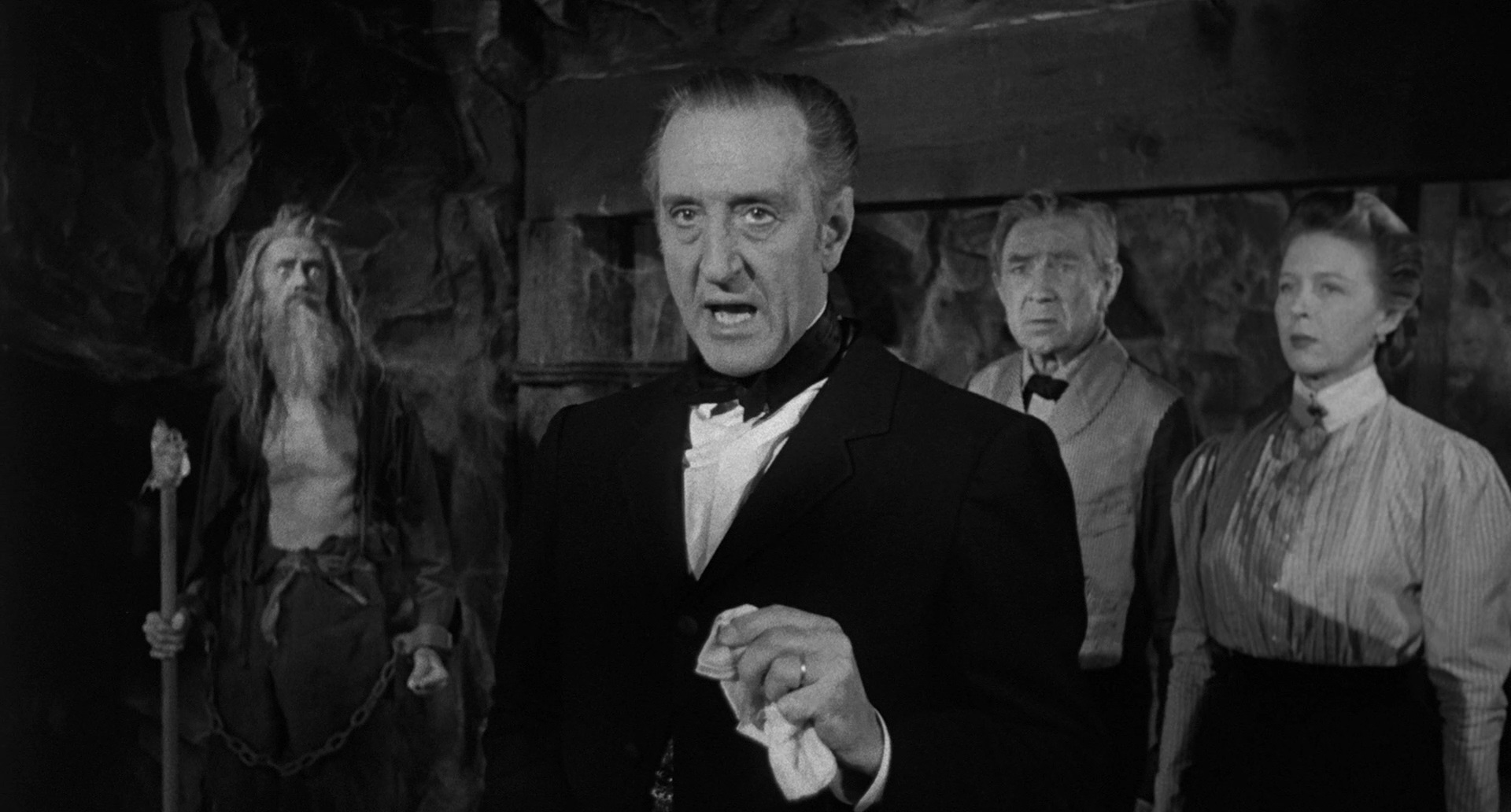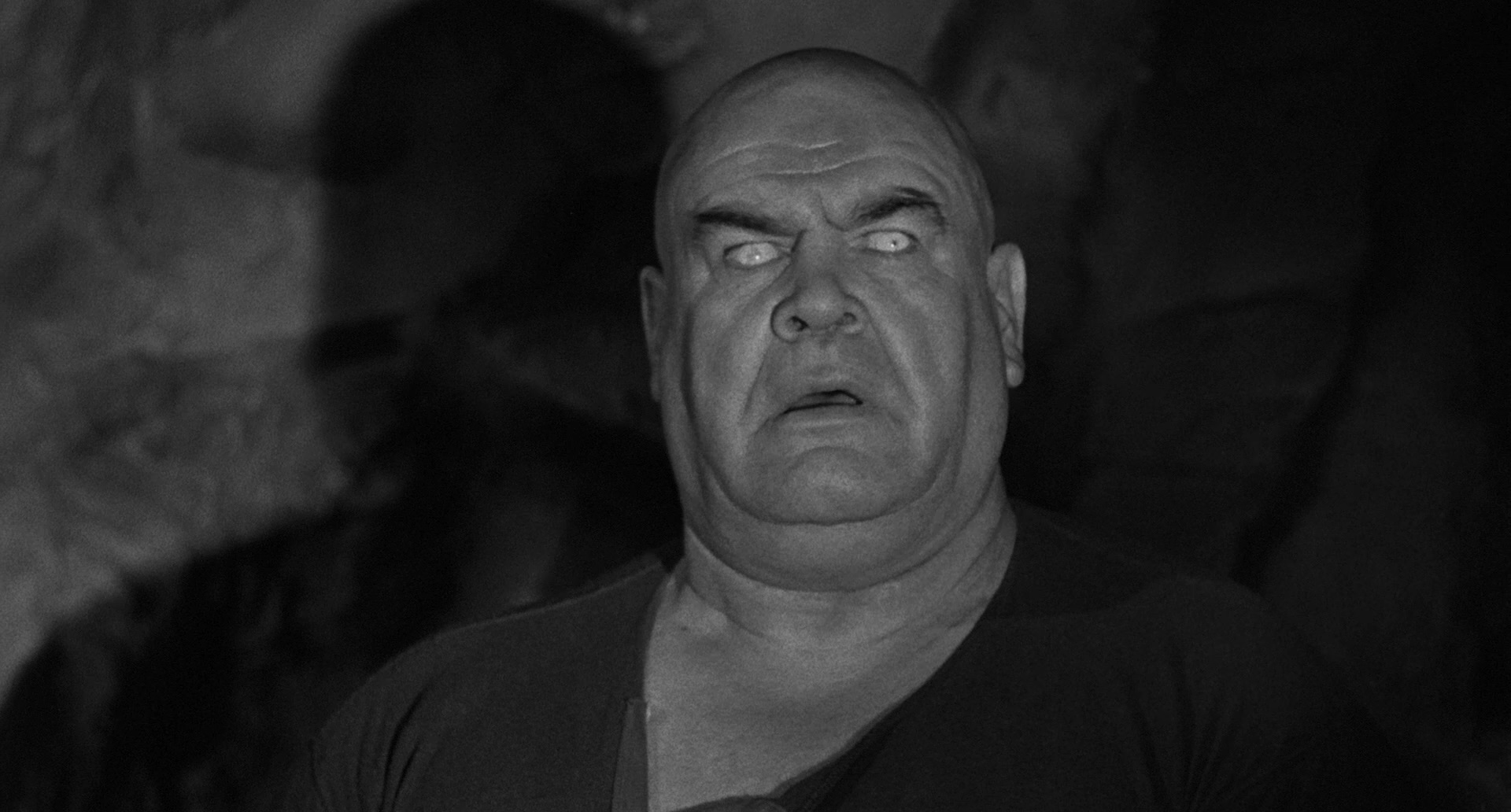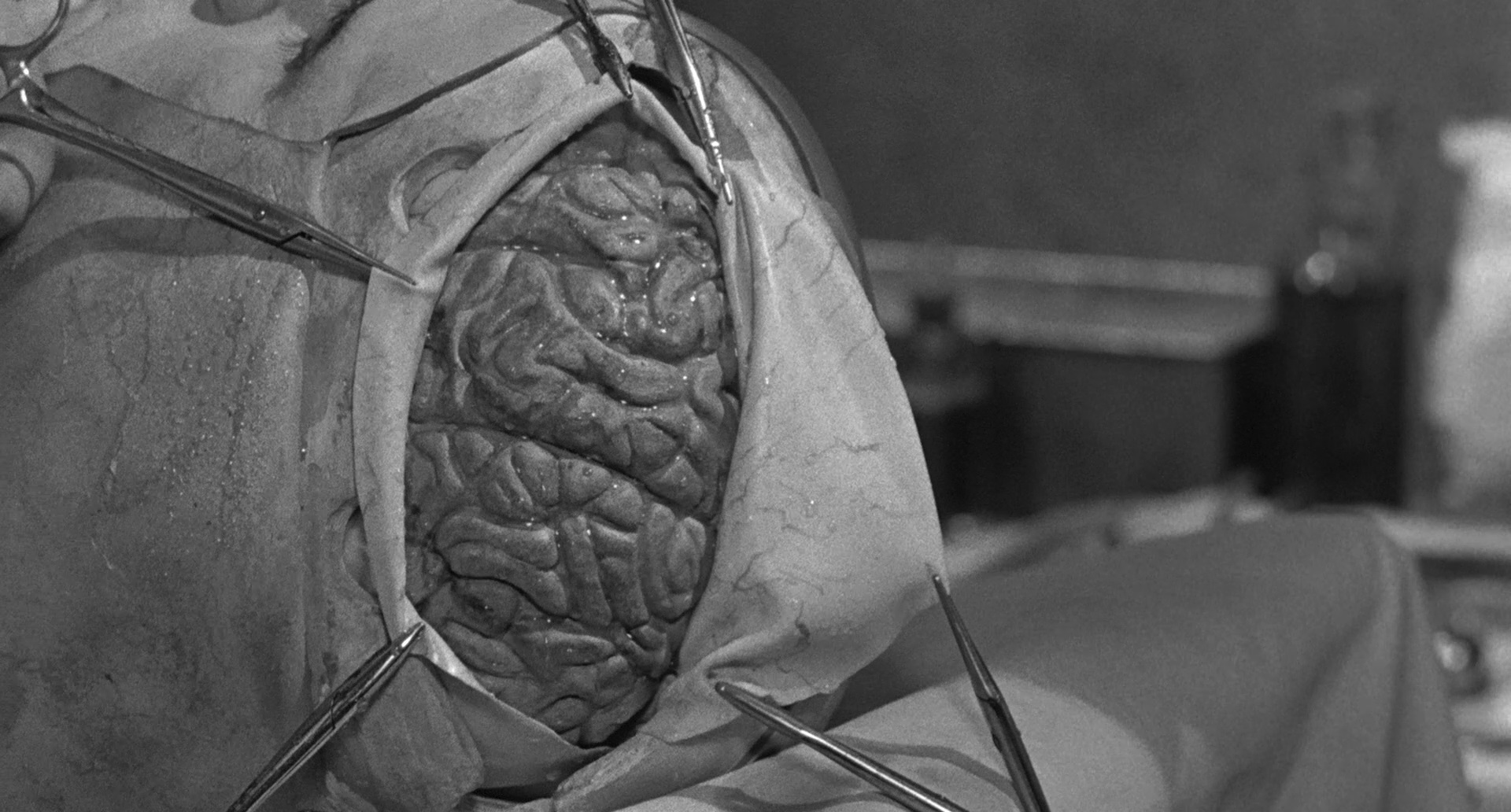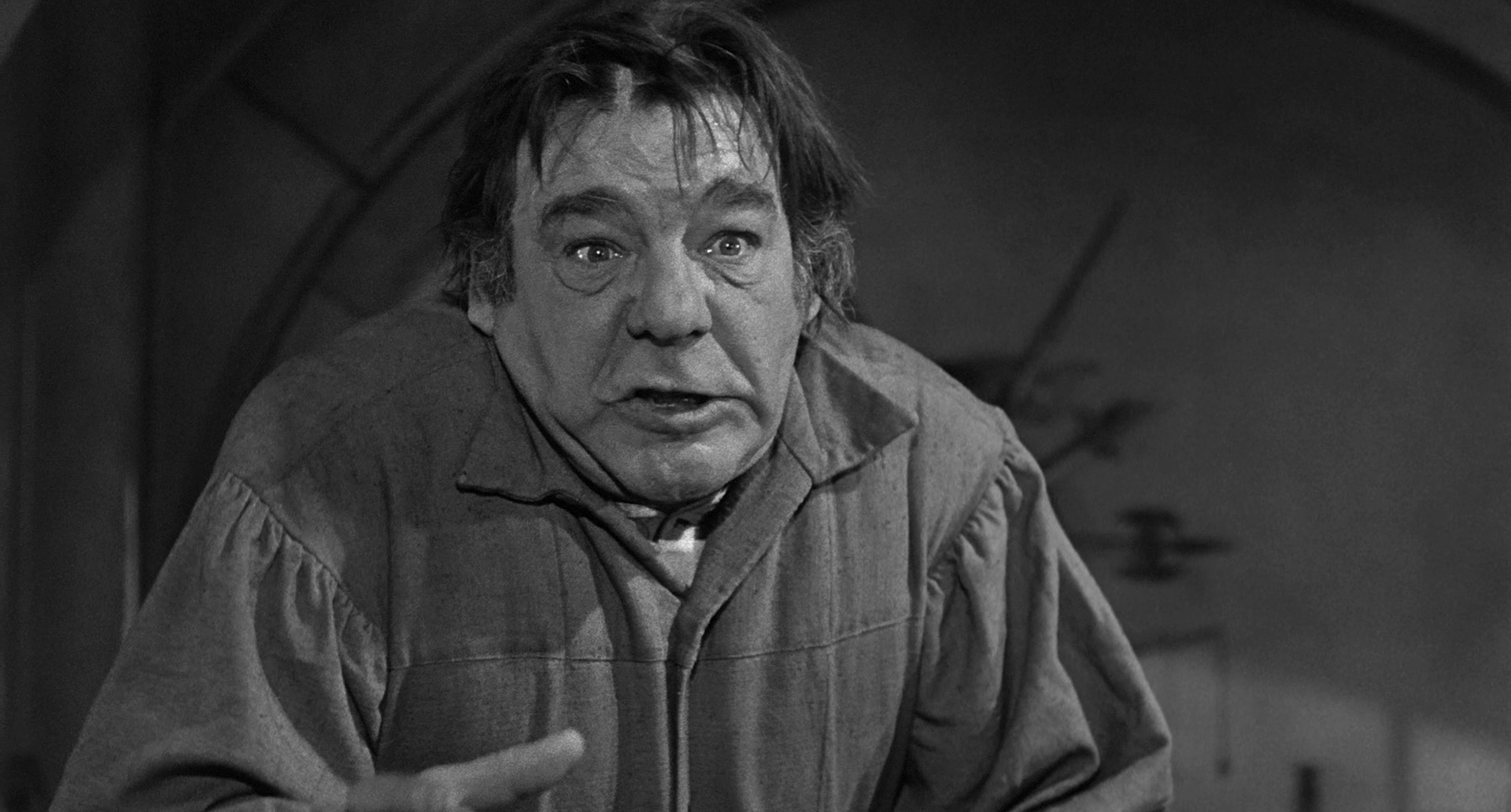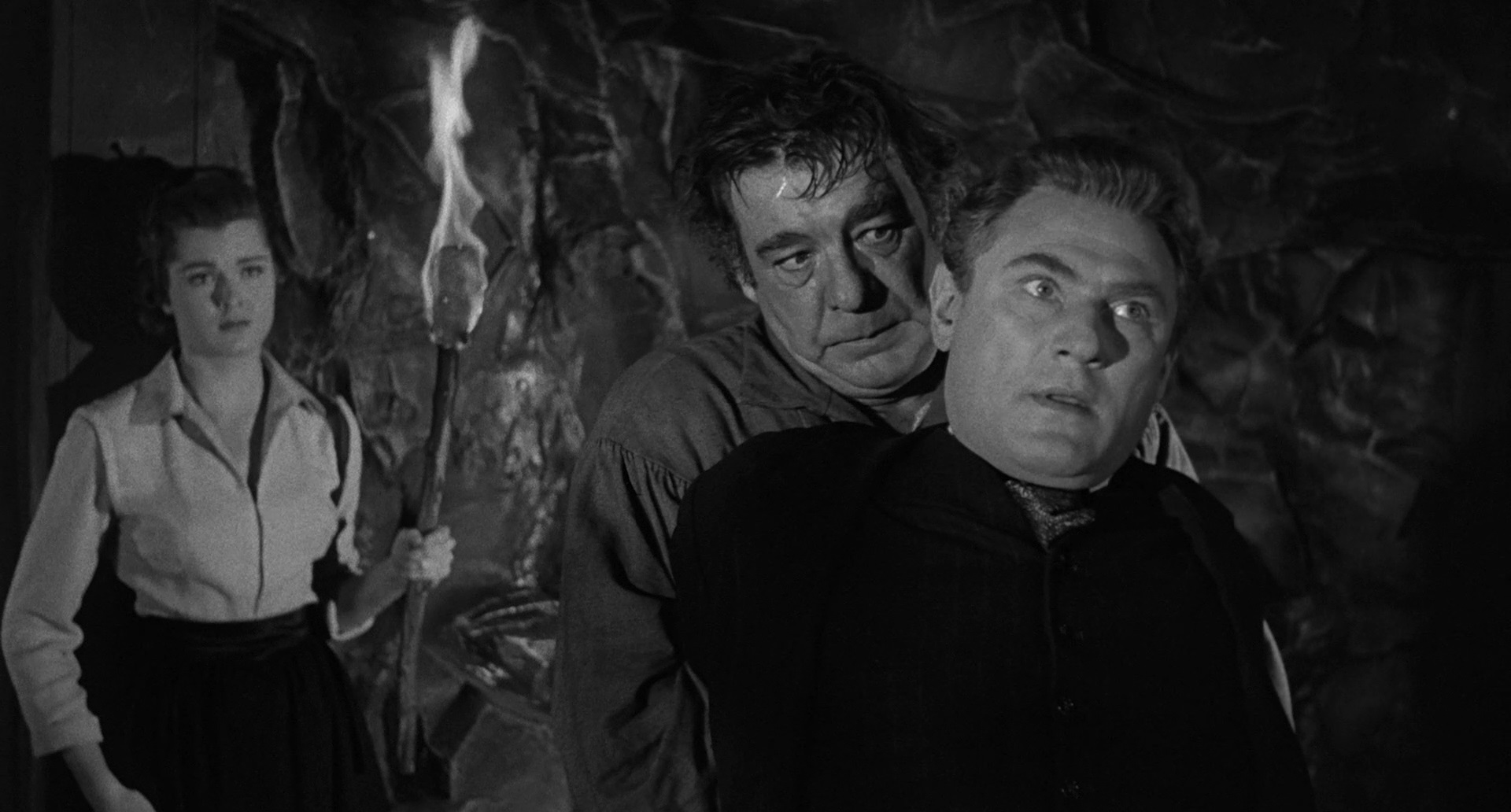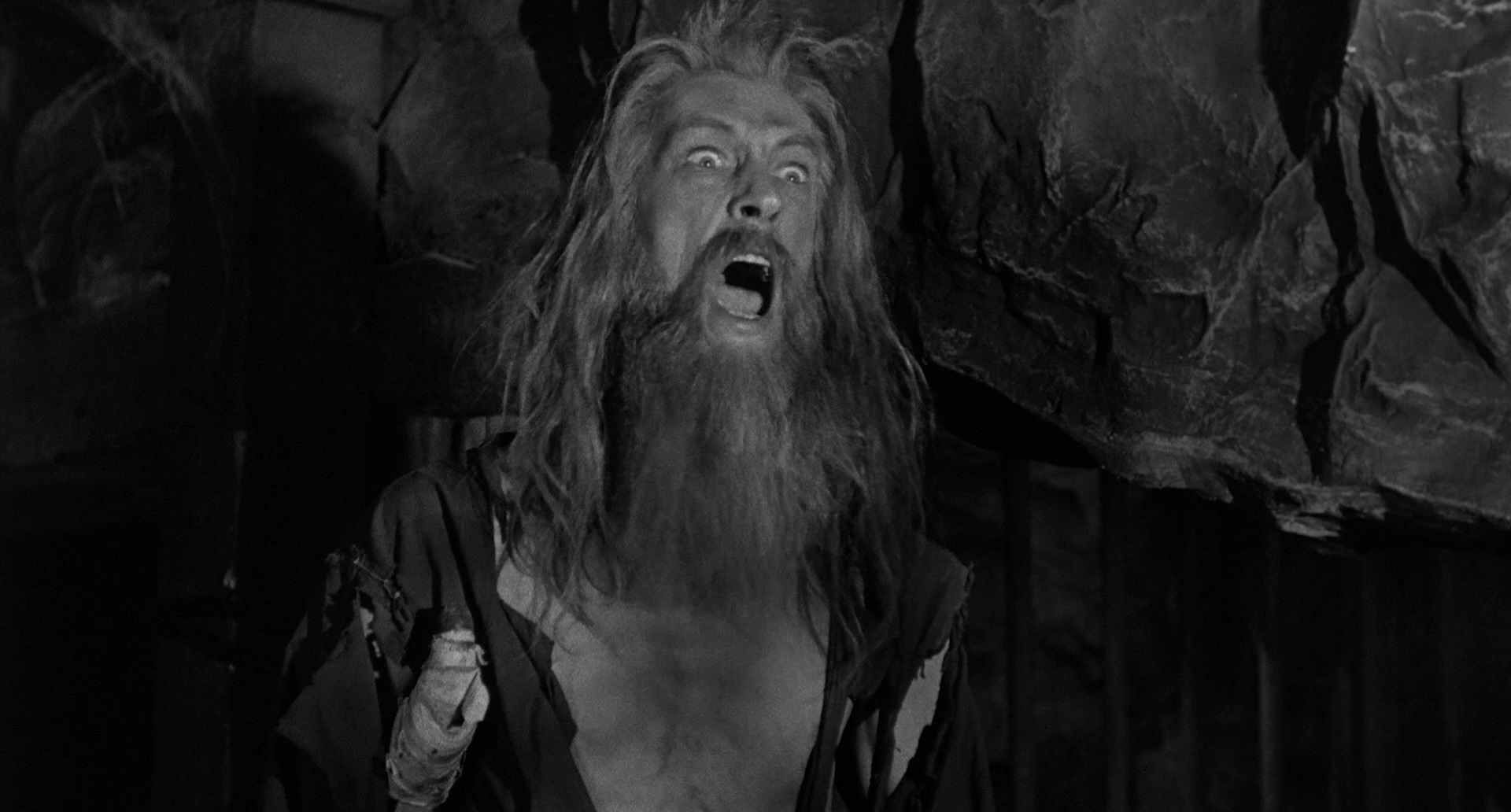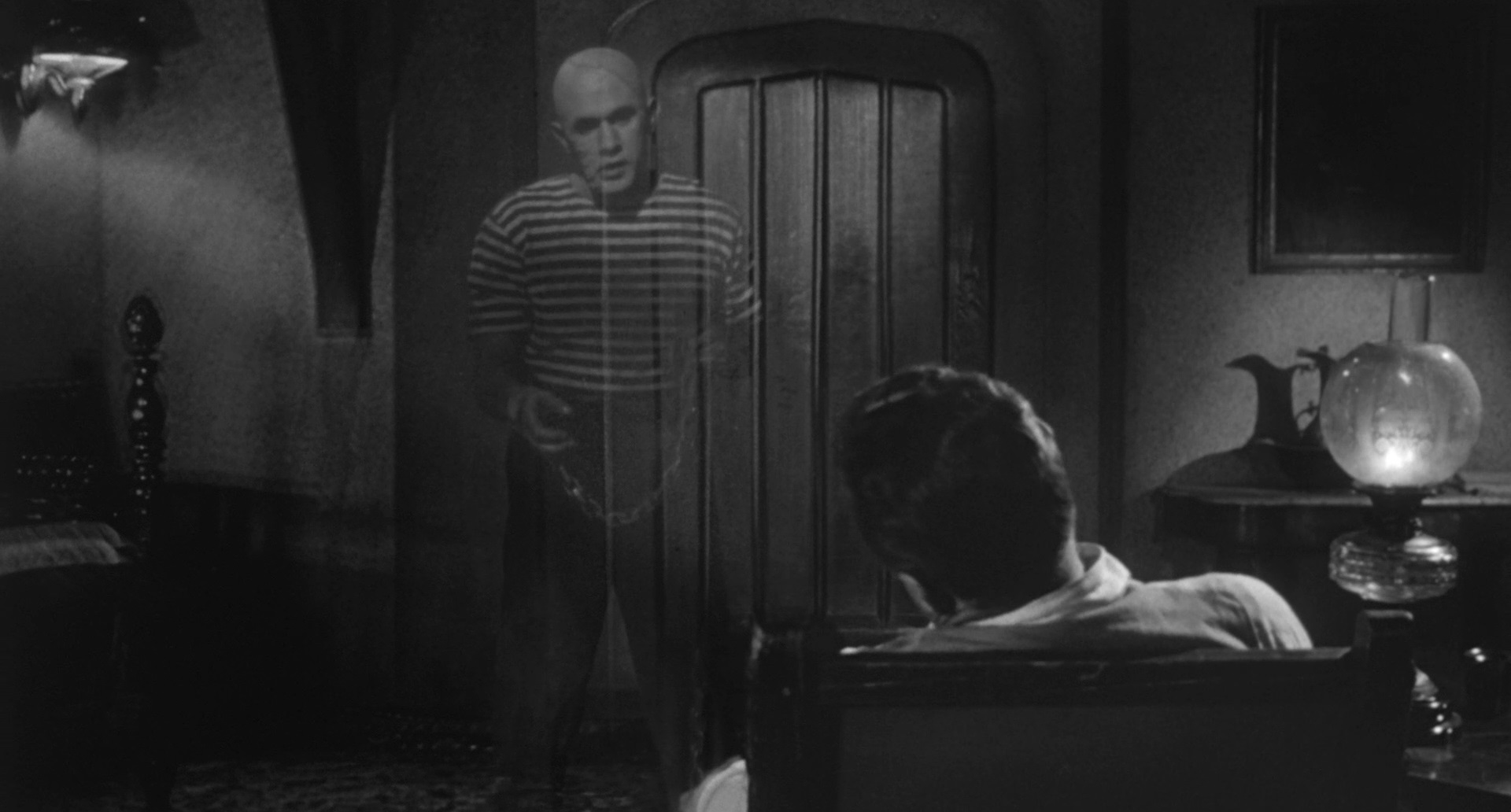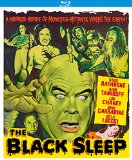| Reviews & Columns |
|
Reviews DVD TV on DVD Blu-ray 4K UHD International DVDs In Theaters Reviews by Studio Video Games Features Collector Series DVDs Easter Egg Database Interviews DVD Talk Radio Feature Articles Columns Anime Talk DVD Savant Horror DVDs The M.O.D. Squad Art House HD Talk Silent DVD
|
DVD Talk Forum |
|
|
| Resources |
|
DVD Price Search Customer Service #'s RCE Info Links |
|
Columns
|
|
|
Black Sleep, The
Kino // Unrated // March 22, 2016
List Price: $29.95 [Buy now and save at Amazon]
A kitchen nightmare? Oh, if only it were that simple for this Gordon Ramsay (Herbert Rudley). Unjustly convicted of the vengeful murder of a moneylender to whom he was deeply in debt, the once-revered surgeon is hours away from a trip to the gallows. After being hanged until dead, his remains are scheduled to be dissected for the benefit of science. One of his professors from decades past, Dr. Cadman (Basil Rathbone), meets with Ramsay the night before his execution. He's arranged for his former pupil's remains to receive a proper Christian burial, and to ease the pain of the noose, Cadman offers Ramsay the gift of a rare Punjabi drug he calls the Black Sleep. Ramsay never does make his appointment with the gallows, however, discovered dead in his cell the following morning. True to his word, Cadman has his gypsy cohort Odo (Akim Tamiroff) carry away the man's lifeless body.
...lifeless, that is, until he's awoken once again.
You see, the Black Sleep is more than just the sedative it's made out to be, instead inducing a state all but indistinguishable from death. Cadman explains that he couldn't possibly allow a mind as gifted as Ramsay's to meet such a grisly end. The aging doctor's young wife (Louanna Gardner) has lain comatose for the better part of a year, and to remove her brain tumor without ravaging any of the gray matter around it, Cadman needs to more thoroughly chart the human mind. To achieve that, he'll need a capable assistant. I snatch you from the clutches of death; you help me restore my wife to the lively woman she once was. Quid pro quo. To remain free of the authorities' watchful eyes, Cadman spirits Ramsay away to his remote Gothic lair, complete with hidden passageways and a secret laboratory. It's hardly the two of them alone in the former abbey, however, as it houses both impossible beauty and unspeakable monstrosities. After nearly being strangled by Mungo (Lon Chaney Jr.), Cadman explains that he hopes to get the mindless brute under his knife and make him whole. Young Laurie (Patricia Blake) isn't so readily convinced, enlisting Ramsay's help in uncovering the true nature of the good doctor's experiments. Seeing as how the movie's tagline is "a horror-horde of monster-mutants walks the earth!", I'll let you guess how that investigation shakes out. Let's just say that no one's signed any consent forms, and we haven't seen the last of the Black Sleep...
The bad news...? The Black Sleep's tagline and freakshow cover art suggest an entirely different movie than the one we actually get. Hell, most of the top-billed actors are barely in it. Bela Lugosi's role as a mute servant is maybe one notch up from a cameo, Lon Chaney Jr. has a small supporting role as an animalistic brute and also has no dialogue, Tor Johnson doesn't show up until the very end, and John Carradine really only gets one standout scene, trapped a thousand years in the past and raving about the fall of Jerusalem.
The good news...? Despite its disinterest in the monster mayhem it was marketed around, The Black Sleep is remarkably effective at what it does set out to accomplish. By 1956, the Gothic thriller was already a relic from another era, and Hammer's revival of the genre was still just off on the horizon. The Black Sleep does a commendable job setting the stage for the likes of The Curse of Frankenstein, and though the film embraces familiar tropes -- a mad scientist, his remote and ancient lair, a laboratory that'd make Frankenstein beam with pride, his monstrous creations, the innocent beauty caught in the middle -- it's played entirely straight. There's a sincere attempt to make viewers believe that this is all very much grounded in reality. Accordingly, it's not campy, it's not cartoonishly ridiculous, and there's certainly nothing accidentally hysterical on display here.
The Black Sleep is propelled by Gothic imagery and reams of dialogue, but despite the sparse thrills, the film skillfully held my attention for every last one of its 82 minutes. The mystery behind it all is rather engaging as well, as the film keeps us just as in the dark as Ramsay is. Even though we know from the outset that there's something malevolent about Cadman, Basil Rathbone nearly convinced me a couple of times that I was too quickly snapping to judgment. I appreciate that there's more to Cadman than just "for science!", proving again that the greatest villains are often the ones who believe they're the heroes of their stories. The ultimate revelation of Cadman's experiments remains chilling even sixty full years later. The freakshow promised on the poster art doesn't arrive until the final fifteen minutes or so, and all hell doesn't break loose until the very end, but it all still seems worth it when the moment arrives. A lesser antagonist might've had me desperate for the mutants to rear their misshapen heads far earlier, but Rathbone ably carries The Black Sleep on his shoulders.
Even in the mid-'50s, The Black Sleep felt like a film trapped in time: a throwback to a style of genre cinema that had long since fallen out of fashion, gruesome enough by the standards of the day to unsheathe censors' scissors (particularly the too-convincing sounds of skulls being sawed open), yet devoid of the more explicit gore and sexuality that Hammer's Gothic horror revival would deliver just a single year later. Though The Black Sleep didn't have the seismic impact of The Curse of Frankenstein, a film with which it shares more than a few similarities, it was still very much a success at the time. Bolstered by a remarkable presentation on Blu-ray, I'm thrilled to say that it continues to endure remarkably well on this, its sixtieth anniversary. Recommended.
Video
"Newly remastered in HD!" exclaims Kino Lorber on the flipside of the case, and boy, do they mean it:
Razor sharp and immaculately detailed, The Black Sleep is a complete and total knockout in high-def. Its filmic texture is tight and unintrusive, contrast is dead-on, and its AVC encode is respectable enough. The closest thing to an authoring concern I have is the instability in the fine lines in Casimir's vest when he's first introduced, although it never quite devolves into moire artifacts or anything like that. There's one shot about halfway through with a bit of judder, along with some slightly uneven aging on the right edge of the screen in a few sequences, all of which are readily shrugged off. There's no meaningful wear or damage worth fretting over here. No matter how high I could've set my expectations beforehand, they still wouldn't have come close to what MGM and Kino Lorber Studio Classics have delivered here. An extraordinary effort all around.
Unlike MGM's on-demand DVD from a few years back, The Black Sleep has been slightly letterboxed here to an aspect ratio of 1.85:1. For what it's worth, the original press notes indicate that the aspect ratio should actually be 1.75:1, but the film isn't noticeably compromised by the faint overmatting. Given its lean 82 minute runtime and limited extras, everything fits comfortably onto a single-layer Blu-ray disc.
Audio
This Blu-ray disc's lossless soundtrack leaves similarly little room for complaint. Presented in 16-bit, two-channel mono, The Black Sleep's DTS-HD Master Audio track is impressively clean and clear. Every last line is readily discerned, not marred by any clipping, distortion, or boxiness. There's no distracting background noise to get in the way, nor are there are any pops, clicks, or the like. I thought I heard the score at one point drop out for a fraction of a second, but that's certainly nothing to give me any pause. I again stand deeply impressed.
A commentary track aside, there are no other audio options.
Extras
The Final Word
The Black Sleep is worlds removed from the unhinged '50s creature feature its poster art makes it out to be. It instead owes more to the sort of Gothic horror that was soon to come back into fashion in a far more lurid form courtesy of Hammer Films. There's nothing particularly visceral or intense about this mad-scientist-in-a-castle mystery, but The Black Sleep still holds up astonishingly well, thanks to a couple of strong central performances and a determination to approach the material with such gravity. Recommended.
...lifeless, that is, until he's awoken once again.
You see, the Black Sleep is more than just the sedative it's made out to be, instead inducing a state all but indistinguishable from death. Cadman explains that he couldn't possibly allow a mind as gifted as Ramsay's to meet such a grisly end. The aging doctor's young wife (Louanna Gardner) has lain comatose for the better part of a year, and to remove her brain tumor without ravaging any of the gray matter around it, Cadman needs to more thoroughly chart the human mind. To achieve that, he'll need a capable assistant. I snatch you from the clutches of death; you help me restore my wife to the lively woman she once was. Quid pro quo. To remain free of the authorities' watchful eyes, Cadman spirits Ramsay away to his remote Gothic lair, complete with hidden passageways and a secret laboratory. It's hardly the two of them alone in the former abbey, however, as it houses both impossible beauty and unspeakable monstrosities. After nearly being strangled by Mungo (Lon Chaney Jr.), Cadman explains that he hopes to get the mindless brute under his knife and make him whole. Young Laurie (Patricia Blake) isn't so readily convinced, enlisting Ramsay's help in uncovering the true nature of the good doctor's experiments. Seeing as how the movie's tagline is "a horror-horde of monster-mutants walks the earth!", I'll let you guess how that investigation shakes out. Let's just say that no one's signed any consent forms, and we haven't seen the last of the Black Sleep...
The bad news...? The Black Sleep's tagline and freakshow cover art suggest an entirely different movie than the one we actually get. Hell, most of the top-billed actors are barely in it. Bela Lugosi's role as a mute servant is maybe one notch up from a cameo, Lon Chaney Jr. has a small supporting role as an animalistic brute and also has no dialogue, Tor Johnson doesn't show up until the very end, and John Carradine really only gets one standout scene, trapped a thousand years in the past and raving about the fall of Jerusalem.
The good news...? Despite its disinterest in the monster mayhem it was marketed around, The Black Sleep is remarkably effective at what it does set out to accomplish. By 1956, the Gothic thriller was already a relic from another era, and Hammer's revival of the genre was still just off on the horizon. The Black Sleep does a commendable job setting the stage for the likes of The Curse of Frankenstein, and though the film embraces familiar tropes -- a mad scientist, his remote and ancient lair, a laboratory that'd make Frankenstein beam with pride, his monstrous creations, the innocent beauty caught in the middle -- it's played entirely straight. There's a sincere attempt to make viewers believe that this is all very much grounded in reality. Accordingly, it's not campy, it's not cartoonishly ridiculous, and there's certainly nothing accidentally hysterical on display here.
The Black Sleep is propelled by Gothic imagery and reams of dialogue, but despite the sparse thrills, the film skillfully held my attention for every last one of its 82 minutes. The mystery behind it all is rather engaging as well, as the film keeps us just as in the dark as Ramsay is. Even though we know from the outset that there's something malevolent about Cadman, Basil Rathbone nearly convinced me a couple of times that I was too quickly snapping to judgment. I appreciate that there's more to Cadman than just "for science!", proving again that the greatest villains are often the ones who believe they're the heroes of their stories. The ultimate revelation of Cadman's experiments remains chilling even sixty full years later. The freakshow promised on the poster art doesn't arrive until the final fifteen minutes or so, and all hell doesn't break loose until the very end, but it all still seems worth it when the moment arrives. A lesser antagonist might've had me desperate for the mutants to rear their misshapen heads far earlier, but Rathbone ably carries The Black Sleep on his shoulders.
Even in the mid-'50s, The Black Sleep felt like a film trapped in time: a throwback to a style of genre cinema that had long since fallen out of fashion, gruesome enough by the standards of the day to unsheathe censors' scissors (particularly the too-convincing sounds of skulls being sawed open), yet devoid of the more explicit gore and sexuality that Hammer's Gothic horror revival would deliver just a single year later. Though The Black Sleep didn't have the seismic impact of The Curse of Frankenstein, a film with which it shares more than a few similarities, it was still very much a success at the time. Bolstered by a remarkable presentation on Blu-ray, I'm thrilled to say that it continues to endure remarkably well on this, its sixtieth anniversary. Recommended.
Video
"Newly remastered in HD!" exclaims Kino Lorber on the flipside of the case, and boy, do they mean it:
Razor sharp and immaculately detailed, The Black Sleep is a complete and total knockout in high-def. Its filmic texture is tight and unintrusive, contrast is dead-on, and its AVC encode is respectable enough. The closest thing to an authoring concern I have is the instability in the fine lines in Casimir's vest when he's first introduced, although it never quite devolves into moire artifacts or anything like that. There's one shot about halfway through with a bit of judder, along with some slightly uneven aging on the right edge of the screen in a few sequences, all of which are readily shrugged off. There's no meaningful wear or damage worth fretting over here. No matter how high I could've set my expectations beforehand, they still wouldn't have come close to what MGM and Kino Lorber Studio Classics have delivered here. An extraordinary effort all around.
Unlike MGM's on-demand DVD from a few years back, The Black Sleep has been slightly letterboxed here to an aspect ratio of 1.85:1. For what it's worth, the original press notes indicate that the aspect ratio should actually be 1.75:1, but the film isn't noticeably compromised by the faint overmatting. Given its lean 82 minute runtime and limited extras, everything fits comfortably onto a single-layer Blu-ray disc.
Audio
This Blu-ray disc's lossless soundtrack leaves similarly little room for complaint. Presented in 16-bit, two-channel mono, The Black Sleep's DTS-HD Master Audio track is impressively clean and clear. Every last line is readily discerned, not marred by any clipping, distortion, or boxiness. There's no distracting background noise to get in the way, nor are there are any pops, clicks, or the like. I thought I heard the score at one point drop out for a fraction of a second, but that's certainly nothing to give me any pause. I again stand deeply impressed.
A commentary track aside, there are no other audio options.
Extras
- Audio Commentary: Tom Weaver brilliantly establishes the tone of this commentary track from word one: reading the introduction from an earlier draft of the screenplay, drenched in ominous reverb. Weaver wants listeners to walk away with a greater appreciation and deeper understanding of The Black Sleep, but he wants you to have fun too. His commentary, as ever, infuses the right amount of personality in with all the insight and thorough research (including Weaver's firsthand conversations with the cast and crew over the course of decades). He expressly makes it a point to cover less familiar topics, steering away from the depressing stories of Bela Lugosi's publicity tour for the film that anyone listening to this has likely heard dozens of times before. The amount of ground covered here is astonishing: Peter Lorre being pursued for the role of the creepy gypsy Odo, dramatic and often head-scratching differences between early drafts and what made it onto the screen, how some footage from the film wound up being recycled in The Brain That Wouldn't Die, Lon Chaney Jr. sweating so profusely that he had to be chased around with a shammy, and everything you wanted to know about its theatrical release (sharing a bill with The Creeping Unknown!) but were afraid to ask. Weaver fields the majority of the commentary by himself, cutting away to Monstrous Movie Music's David Schecter for a lengthy and insightful discussion about the film's score which may or may not have been composed by Les Baxter. This is an absolutely essential listen.
Weaver mentions some of the promotional interviews sent to TV stations throughout the country that still survive -- without questions, so reporters could dub in their own voices and pretend they're speaking with the cast -- but, alas, none of that footage made it onto this Blu-ray disc.
- Trailers (4 min.; SD): A pillarboxed 4x3 trailer is delivered in standard definition. Joe Dante also chimes in with a "Trailers from Hell" commentary, this time over a widescreen reissue trailer under the title Dr. Cadman's Secret.
- Animated Image Gallery (2 min.; HD): A gallery of production stills and poster art rounds out the extras.
The Final Word
The Black Sleep is worlds removed from the unhinged '50s creature feature its poster art makes it out to be. It instead owes more to the sort of Gothic horror that was soon to come back into fashion in a far more lurid form courtesy of Hammer Films. There's nothing particularly visceral or intense about this mad-scientist-in-a-castle mystery, but The Black Sleep still holds up astonishingly well, thanks to a couple of strong central performances and a determination to approach the material with such gravity. Recommended.
|
| Popular Reviews |
| Sponsored Links |
|
|
| Sponsored Links |
|
|
| Release List | Reviews | Shop | Newsletter | Forum | DVD Giveaways | Blu-Ray | Advertise |
|
Copyright 2024 DVDTalk.com All Rights Reserved. Legal Info, Privacy Policy, Terms of Use,
Manage Preferences,
Your Privacy Choices | |||||||









